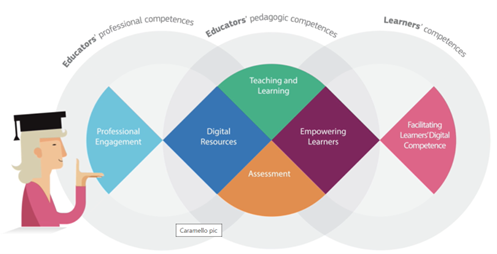Enabling technologies are increasingly bursting in and are present in all areas of our lives. In the case of the education system, it must not only adapt, but must also be an active agent of change and innovation. The entire educational community (students, teachers, families, educational institutions...) must take ownership and know how to take advantage of all the opportunities offered by enabling technologies for teaching, learning, communication and creativity.
In this sense, the DTAM project proposes the incorporation of some enabling technologies within the educational level of Vocational Training, with the aim of improving and diversifying teaching and learning practices, and the development of new digital competences.
We know that the current education system faces multiple challenges. One of them is its adaptation and transformation not only in terms of pedagogy, but also in terms of work organisation, infrastructure and governance. In this context, the transformation of the education system must be driven by experimentation and the use of digital environments to improve institutional and pedagogical practices. Under this premise, the DTAM project also offers a virtual Lab in the field of IoT in which both teachers and students can experiment their processes, designs and developments of new prototypes.
To ensure a successful transformation of the education system for the digital age, the education system must take action by playing an active role in the digital revolution, equipping both teachers and students with the right digital skills. So, in the case of the DTAM project, we see that it is a strategic project that can drive the digital transformation of the education system.
Moreover, the DTAM project also addresses the two key strategic priorities of the European Commission's Digital Education Action Plan (2020), in order to adapt education and training systems to the digital age, given that:
· Encourages the development of a high-performance digital education ecosystem: through the pooling of infrastructure, connectivity, user-friendly and secure tools, and high-quality learning content between different project actors.
· Enhances digital competences and skills for digital transformation: through the development of advanced digital skills that generate more digital specialists.
Finally, we would like to emphasise that we are convinced that the integration of digital technologies into the education system will not only transform our educational institutions, but will generate learning environments that ensure an education consistent with the demands of today's world, that enables everyone to participate fully, that promotes equity in our society and that fosters professional development in order to respond to the profiles of the future in the knowledge society, and we believe that the DTAM project will contribute to achieving all of this.

|
|
Source: Digital Competence of Educators
(DIGCO
MPEDU), European Commission (2020).
?unique=71f5a75)